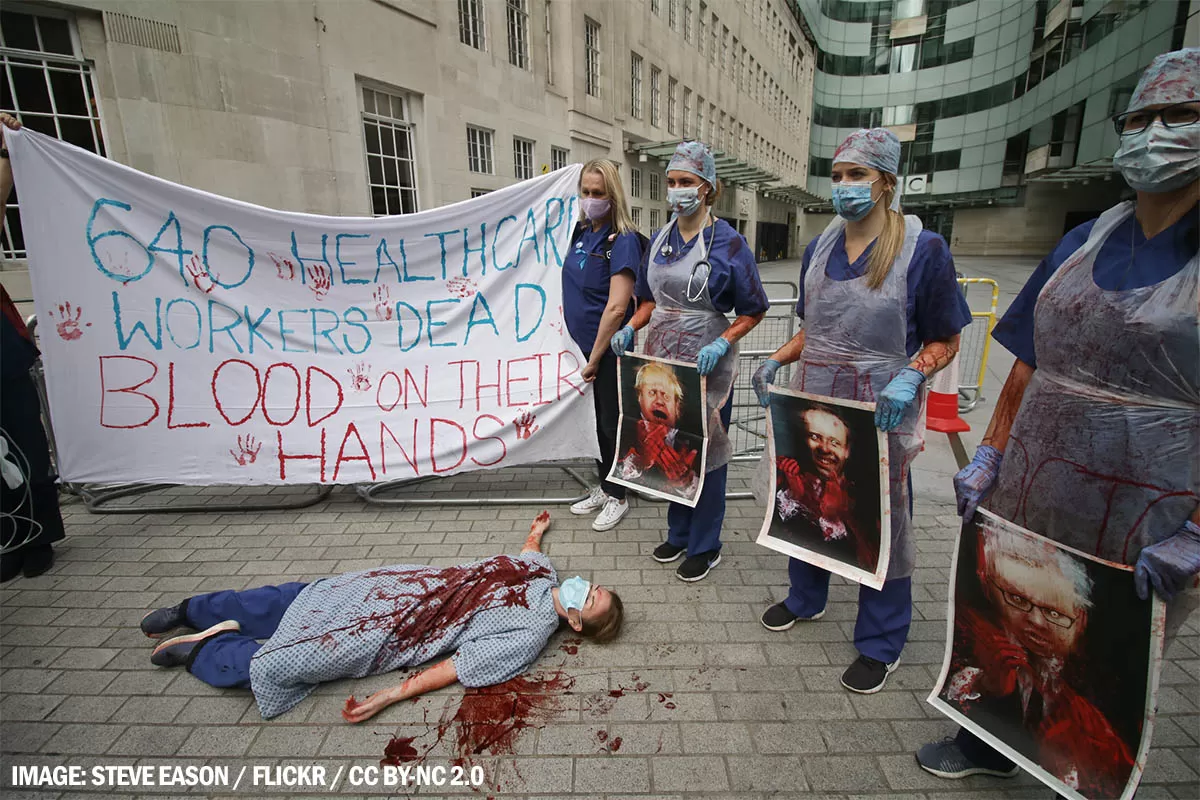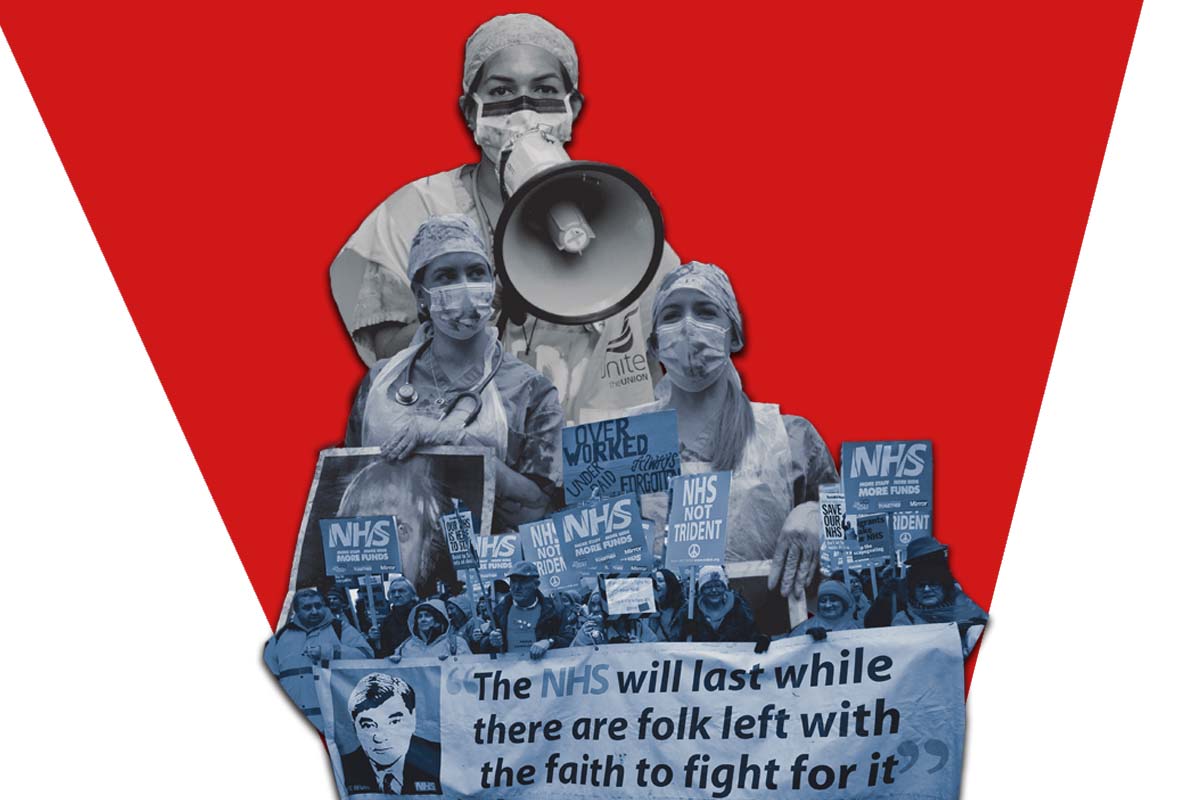Due to years of privatisation, austerity, and attacks on workers, hospitals are struggling to keep up with the demand for treatment, with waiting lists swelling to record numbers during the pandemic. We need socialist policies to save our NHS.
Recent data released by NHS England estimates that the number of people waiting for planned hospital care could rise to a record-breaking 10.4 million by March 2024.
These numbers come as no surprise. Even before the coronavirus crisis, demand for hospital treatment outstripped capacity.
Nevertheless, the size of the backlog is staggering. Over two million patients will now have to wait up to 18 weeks before they receive treatment. Of these, 310,000 will wait a year – a 200-fold increase on pre-pandemic levels. For cancer treatment, there is a 26% gap between actual versus target rates.
For many, this will mean uncertainty, pain, suffering, and likely a premature death.
Decades in the making

We must be clear: the pandemic is not solely responsible for this crisis. Years of austerity and privatisation by successive Tory and New Labour governments are to blame.
On the eve of COVID-19 arriving in Britain, the backlog already stood at four million. And it has been almost a decade since NHS managers last met their A&E target of 95% of patients with major conditions being seen within four hours.
The current crisis comes from years of woeful neglect and constant underfunding.
Since Tory austerity started in 2010, the NHS has received lower funding increases than those seen in previous decades. Between 2009-2019, healthcare budgets rose by an average of 1.4% per year, compared to an average rise of 3.7% since the NHS was established.
Circling like vultures
The parasitic private sector has profited greatly from the crisis within the NHS. Around £400 million per month has flowed from the public purse to private companies, in return for access to more beds and other resources.
The private healthcare sector is taking public funding that could address the current workforce crisis and patient backlog.
Last month, Tory health secretary Sajid Javid ordered the NHS to pay £270m as a “minimum income guarantee” to private hospitals, so that they could operate on standby in preparation for a possible Omicron surge – even if no additional patients end up being treated.
Reducing the backlog

There are many obstacles to reducing the backlog. The NHS confederation, which represents hospital trusts, warned that performance is likely to deteriorate even further in coming weeks, due to rising sickness among the hospital staff.
“Too many nursing staff are exposed to COVID-19 at work due to improper protection,” warned Patricia Marquis, director of the Royal College of Nursing (RCN) in England. “Highest grade FFP3 masks and priority testing need to be provided as standard.”
Current modelling predicts that the government will only be able to reduce waiting lists by two million within the next three years. This would still leave 8.5 million patients who are not able to obtain treatment within three months of being referred.
Under pressure
To address the backlog requires a well-supported workforce. Instead, a decade of cuts has left healthcare workers exhausted, overstretched, and underpaid.
Six out of 10 nurses are considering exiting the profession, or are actively planning to leave their current role. Reasons cited are: regularly working beyond contracted hours; feeling under too much pressure; and believing that they cannot deliver the necessary level of care.
Similarly, last year, 58% of doctors reported symptoms of depression, anxiety, or burnout.
With 100,000 vacancies across the NHS, a dwindling number of workers are being left to handle this crisis created by the bosses and the Tories.
Consultative ballots by the RCN indicate support for industrial action amongst NHS staff. This shows that health workers may be tired, but they are ready to fight for fair pay and the chance to deliver high-quality care.
A house divided
Earlier this month, the government announced its ‘Elective Recovery Plan’ for tackling NHS waiting lists. The costs of reducing the backlog, however, are exacerbating rifts in the Tory Party.
There have been reports that Chancellor Rishi Sunak has refused to give the Treasury’s support to the plan, as long as Boris Johnson’s future hangs in the balance.
In other words, while the Tory government collapses, patients are made to wait to hear their fate.
At the same time, there are concerns that the planned rise in National Insurance will not provide enough additional funding to meet needs, with demand for social care estimated to be rising by 4% per year.
An increase in NHS funding (paid for by already-struggling workers) will not fix deep-rooted structural issues: an encroaching private sector; bureaucratic mismanagement; and a shrinking workforce.
Whichever way you look at it, workers are being made to foot the bill: waiting longer for treatment; paying more in taxes; receiving less in real-term wages; and working longer and harder to prop up a healthcare system that is crumbling under the weight of austerity, privatisation, and capitalist crisis.
Socialist solution

Workers are seeing through the Tory lies that ‘we’re all in this together’.
While bosses, bankers, and politicians celebrate another pay rise, the entire cost of health and social care is being loaded onto the working class, who are already struggling with a cost-of-living catastrophe, pay freezes, and cuts to public services.
We say: Enough is enough! It is time to make the capitalists pay for this crisis!
- For a fully-staffed NHS, with a union-led mass recruitment drive to overcome staff shortages! Fight for a 15% pay rise for all healthcare workers!
- Bring all healthcare services and contracts back in-house! Nationalise Big Pharma and all private healthcare providers, without compensation!
- Boot out the bureaucrats! Put those who know best in charge, by running the NHS under democratic workers’ control!






